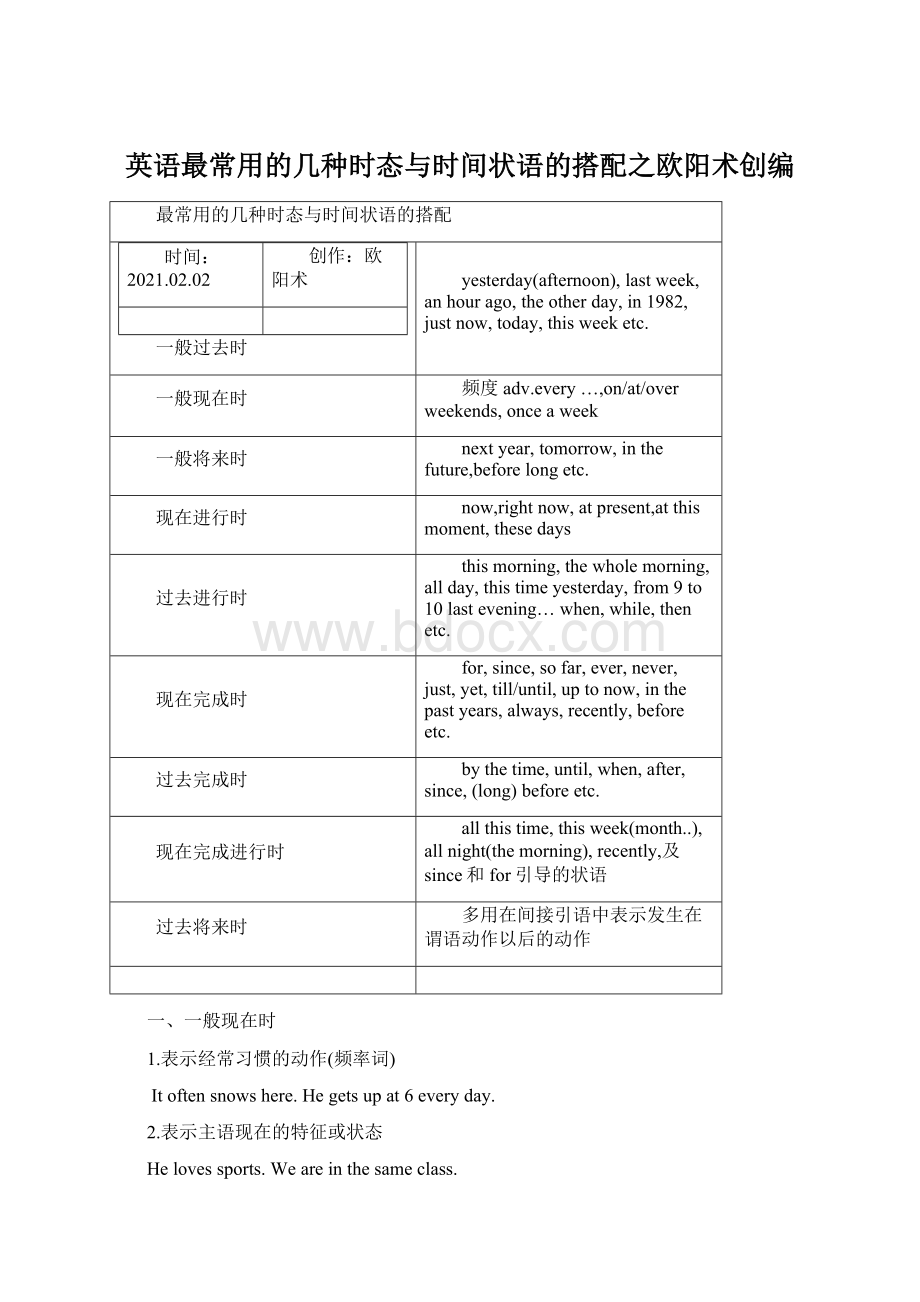英语最常用的几种时态与时间状语的搭配之欧阳术创编文档格式.docx
《英语最常用的几种时态与时间状语的搭配之欧阳术创编文档格式.docx》由会员分享,可在线阅读,更多相关《英语最常用的几种时态与时间状语的搭配之欧阳术创编文档格式.docx(8页珍藏版)》请在冰豆网上搜索。

thismorning,thewholemorning,allday,thistimeyesterday,from9to10lastevening…when,while,thenetc.
现在完成时
for,since,sofar,ever,never,just,yet,till/until,uptonow,inthepastyears,always,recently,beforeetc.
过去完成时
bythetime,until,when,after,since,(long)beforeetc.
现在完成进行时
allthistime,thisweek(month..),allnight(themorning),recently,及since和for引导的状语
过去将来时
多用在间接引语中表示发生在谓语动作以后的动作
一、一般现在时
1.表示经常习惯的动作(频率词)
Itoftensnowshere.Hegetsupat6everyday.
2.表示主语现在的特征或状态
Helovessports.Weareinthesameclass.
3.表示永恒不变的真理和事实或格言警句
Knowledgeispower.Thesunrisesintheeast.
特殊用法:
1.按计划(时间表/时刻表/日程表)将要发生,句中有时有将来的时间状语,但不用将来时,要用一般现在时
1.Lookatthetimetable.Hurryup!
Flight4026_A_offat8:
20.(06四川)
A.takesB.took
C.willbetakenD.hastaken
2.Thetrain_leaves_atthreethisafternoon.
2.状语从句“主将从现”…时间、条件、方式、让步状语从句中用现在时表示将来“主将从现”if/when/until/assoonas/though...
一般现在时:
表示将要发生的动作现在完成时:
表示将来已经完成的动作
1.Iftheirmarketingplanssucceed,they_A_theirsalesby20percent.(2008全国2)
A.willincreaseB.havebeenincreasing
C.haveincreasedD.wouldbeincreasing
2.I_C_leaveattheendofthismonth.
Really?
Idon’tthinkyoushouldleaveuntilyou__anotherjob.
A.amgoingto,findB.will,willfound
C.amgoingto,havefoundD.will,hadfound
二、一般过去时
1.表在过去发生的和现在没有联系的动作或状态
明示:
yesterday,ago,last…,justnow,in1990
暗示:
whenIwasalittlegirl,whenheputonhiscoat
2.描述过去的情况
言外之意:
只有过去如此现在并非如此
Edward,youplaysowell.ButI__youplayedthepiano.(2009全国I)
A.didn'
tknowB.hadn'
tknown(A)
C.don'
tknowD.haven'
tknown
三、一般将来时
1.表示将要发生的动作或存在的状态
I’llreturnyouthebooknextweek.She’llbetwentyyearsoldnextyear.
2.表示一种倾向或习惯动作
We’lldiewithoutairorwater.WheneverI’mintrouble,he’llcometohelpme.
表示将来时的六种形式
①will/shall+动词原形(单纯的将来/说话时的临时决定)
②begoingtodo(客观计划)
③beabouttodo(即将/马上要做某事)
④betodo(表示职责命令,相当于should/must;
或表示“注定”)(可用于条件句中)
⑤bedoing(瞬间动词用表将来)
⑥一般现在时(强调动作“列入日程”)
1)begoingto表示即将发生的或最近打算进行的事情,而will表示谈话时临时决定的意图,具有临时性和偶然性。
—Kateisinhospital.(A)
—Oh,really?
I_______.________visither.
A.didn’tknow;
I’llgoand
B.don’tknow;
I’llgoand
C.don’tknow;
I’mgoingto
D.didn’tknow;
I’mgoingto
---Alice,whydidn’tyoucomeyesterday?
(C)
---I_____,butIhadanunexpectedvisitor.
A.hadB.wouldC.wasgoingtoD.did
2)begoingto可用来表达某种迹象要发生的事。
而will不能表示
Lookattheclouds!
It’sgoingtorain.
3)beabouttodo=beonthepointofdoing表示说话时就要发生的动作,不与表示将来的时间状语连用。
常构成句型:
…beabouttodo…when….
when并列连词就在这时
Iwasabouttoleavewhenitrained.
4).betodo表示约定,计划≈begoingto;
职责、义务;
命令、要求;
可以;
想要;
不可避免,注定要发生的事等(过去式was/weretodo)betodo可用于条件从句中
TheQueenistovisitJapaninaweek’stime.(计划)
Youaretoreporttothepolice.(要求)
Youarenottomakenoisesintheclassroom.(命令)
Suchpeoplearetobefoundeverywhere.(可以)
Ifwearetobetherebeforeten,we’llhavetogonow.(想要)
Thisdiscoverywastohaveamajoreffectonthetreatmentofheartdisease.(注定要发生)
Youaretoanswerforwhatyouhavedone..(注定要发生)
Evenifthesunweretoriseinthewest,Iwouldneverdosuchathing.(虚拟条件句)
5)某些瞬间动词“go,come,arrive,leave,start,begin,fly,take”等用现在进行时表示将要发生的动作。
I’vewonaholidayfortwotoFloria.I______mymum.(A)
A.amtakingB.havetakenC.takeD.willhavebeen
6)一般现在时表示将来,特别用于车、船、飞机等时刻表中安排好的。
Theplaneleavestomorrow.(尽管有tomorrow,但没有will,begoingto)
四、现在进行时
1.此刻正在进行的动作(look,listen,now)
WearehavinganEnglishlessonnow.
2.短期内持续的动作(当时不一定在进行)
I’mpreparingforthetestthesemonths.
3.与always,usually,allthetime,forever,continually,constantly连用,表示某种情绪,
Youarealwaysforgettingtheimportantthings.
Myteacherisforevercriticizingus.
Mywifeisaskingmeformoneyallthetime.
1.现在进行时可以表示一般将来时,常用于下列动词:
go,come,leave,begin,arrive,return,fly,drive,take等。
We’removingtothenewbuildingnextweek.
2.表示“存在,所有,知觉,认识,感情”等状态的词一般不用于进行时态
存在:
keep,stay,remain,be,consistof,contain
所有:
have,belongto,possess,own,hold
知觉:
sound(听起来),look/seem/appear(看起来),
smell(闻起来),taste(尝起来),feel(摸起来),see,hear
认识:
understand,know,suppose,remember,admit,forget,believe,think
情感:
like,love,hate,prefer,
3.表示委婉意义
某些动词,如hope,want,wonder等与进行时连用时,常探询式地表示一种愿望或态度。
此用法在语言上显得含蓄、委婉,如果改用现在时,则显得不那么隐讳且稍欠礼貌。
I'
mhopingtoborrowsomemoney.我希望借些钱。
Iwaswonderingifyoucouldhelpme.不知道你能否帮助我。
4.be有时可用于进行时,强调短暂的行为或表示“故意”;
而一般现在时则表示永久的特征。
Youareno